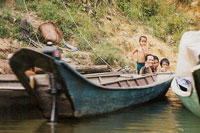Ancient tribe in Borneo threatened by severe poverty
An ancient tribe of hunters and gatherers in Borneo's jungles is being threatened by severe poverty and companies that clear land for logging and oil palm projects, Malaysia's government-backed human rights watchdog said Friday.

An estimated 15,485 Penan tribespeople live in Malaysia's eastern Sarawak state, roughly 97 percent of whom have abandoned their traditional nomadic lifestyle in favor of permanent rural settlements in recent decades, the Human Rights Commission said in a report compiled by its officials who visited Penan sites over the past year.
"A majority of the Penans remain one of the most deprived communities in Malaysia," the report said. "Apart from land issues, the survival, livelihood and development of the Penans is further stunted as a majority of them live in abject poverty."
Despite cultivating rice and vegetables on small farms, many Penans - who have a unique, centuries-old system of establishing ownership and stewardship of land that is handed from one generation to the next - remain reliant on rain forests to supply their food, which includes wild boar, sago and jungle fruits, and other necessities.
However, they fear their ancestral land is increasingly being violated by logging and oil palm plantation activities, particularly because laws do not recognize or protect their indigenous customs and right to land ownership, the rights panel's report said.
"Claims made (by Penans) on ancestral land are often not considered by the relevant authorities and those who clear the forest areas and commence logging and oil palm activities," the commission said, adding that the state government should review its nearly 50-year-old Sarawak Land Code to change provisions on native customary land rights.
Since the 1980s, Penan communities have sometimes thrown up human barricades to stop timber companies from entering lands. They have attracted the attention of Western campaigners such as Swiss activist Bruno Manser, who vanished in Sarawak in 2000 while traveling to meet up with the Penans and was declared dead by a Swiss court in 2005.
The Penans, many of whom now live in communal longhouses on stilts, also need the government's help in socio-economic matters because they have scant access to poverty eradication programs and other amenities, including nutritious food and clean water, health care and formal education, the commission's report said.
"Measures to enhance accessibility to financial assistance need to be implemented," the report said. "Affirmative action needs to be formulated and implemented to facilitate the enrollment of Penan children in secondary schools and at the tertiary level."
The Malaysian government reviews recommendations made by the commission but is not obliged to carry them out.
Subscribe to Pravda.Ru Telegram channel, Facebook, RSS!


